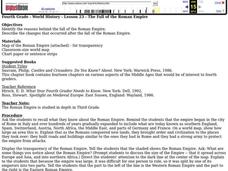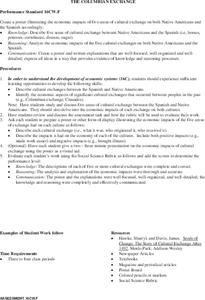Cave Creek Unified School District
Crusades and Culture in the Middle Ages
The Crusades sounds like a glamorous time period in the Middle Ages full of glory—but was it? Scholars find and review the truth of the Crusades' influence on the world through the resource. The study guides, separated individually by...
Curated OER
The Crusades: Routes of Two Crusaders
Use these worksheets to kick off a great lesson on The Crusades. Eighth graders will analyze a map and four short passages to answer six reading comprehension questions.
Curated OER
The Crusades
Students discover the reasons the Crusades were fought. For this Crusades lesson, students break into groups and research what happened, who was involved and the outcome. Students create a poster with the information and present it to...
Curated OER
The Crusades
Students investigate the series of religious wars known as the Crusades. In this Crusades instructional activity, students research Christian and Muslim beliefs and create posters that compare the two. Students discuss the causes of the...
Curated OER
The Roman Empire
Fourth graders identify the reasons behind the fall of the Roman Empire and describe the changes that occurred after the fall of the Roman Empire.
Curated OER
Should Britain Leave the EU?
Tenth graders analyze the reasons to why Great Britain wants to leave the European Union. In this European Union lesson, 10th graders read an article and answer comprehension questions. Students participate in a debate on the European...
Curated OER
The Emancipation Proclamation
Middle schoolers read one of the most important documents in our nation's history: The Emancipation Proclamation of 1863. After everyone reads the proclamation, they set out to write a "You Were There" type of report on it. They pretend...
Curated OER
Medieval Clothing and Fashion
Learners examine the clothing of medieval times. In this Middle Ages lesson, students view their instructor in the clothing of the era. Learners then research the clothing worn by the people of the time period and create booklets that...
Curated OER
Eli Thayer and the Kansas-Nebraska Act
Learners determine how states were identified as slave states or free states. In this Kansas-Nebraska Act lesson, students explore the work of Eli Thayer as well as the work of Thayer's supporters in Massachusetts.
Curated OER
The Columbian Exchange
Students are introduced to the events of the Columbian Exchange. In groups, they identify and describe five main areas of cultural exchange between the Spanish and the Native Americans. They examine the economic impact of each area on...
Curated OER
Intro to Exploration
In this introduction to exploration study guide worksheet, students respond to 14 short answer questions. The questions correlate to assigned readings in a textbook.
Curated OER
Why Study History?
Students interpret historical evidence presented in primary and secondary resources. In this world history lesson, students research several historical events and their impact. Students compose essays that address the question, "Why...
Curated OER
Oral History: Interviewing Elders
Sixth graders examine oral history traditions. They interview family members about their childhoods and compare them to their own. Students use the collected information to make posters, letters, essays, or poems about their research.
Curated OER
Dorothea Dix: Reform in Massachusetts
Young scholars examine the life and reform efforts of Dorothea Dix on behalf of people with disabilities. They discover how her efforts resulted in the passage of legislation. They also examine the care people with disabilities receive.















